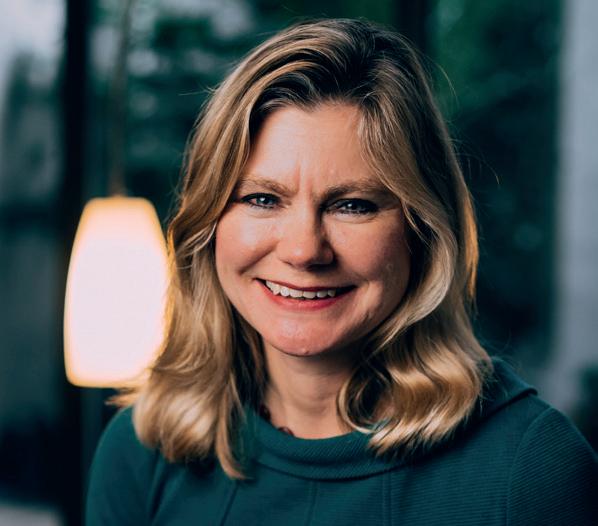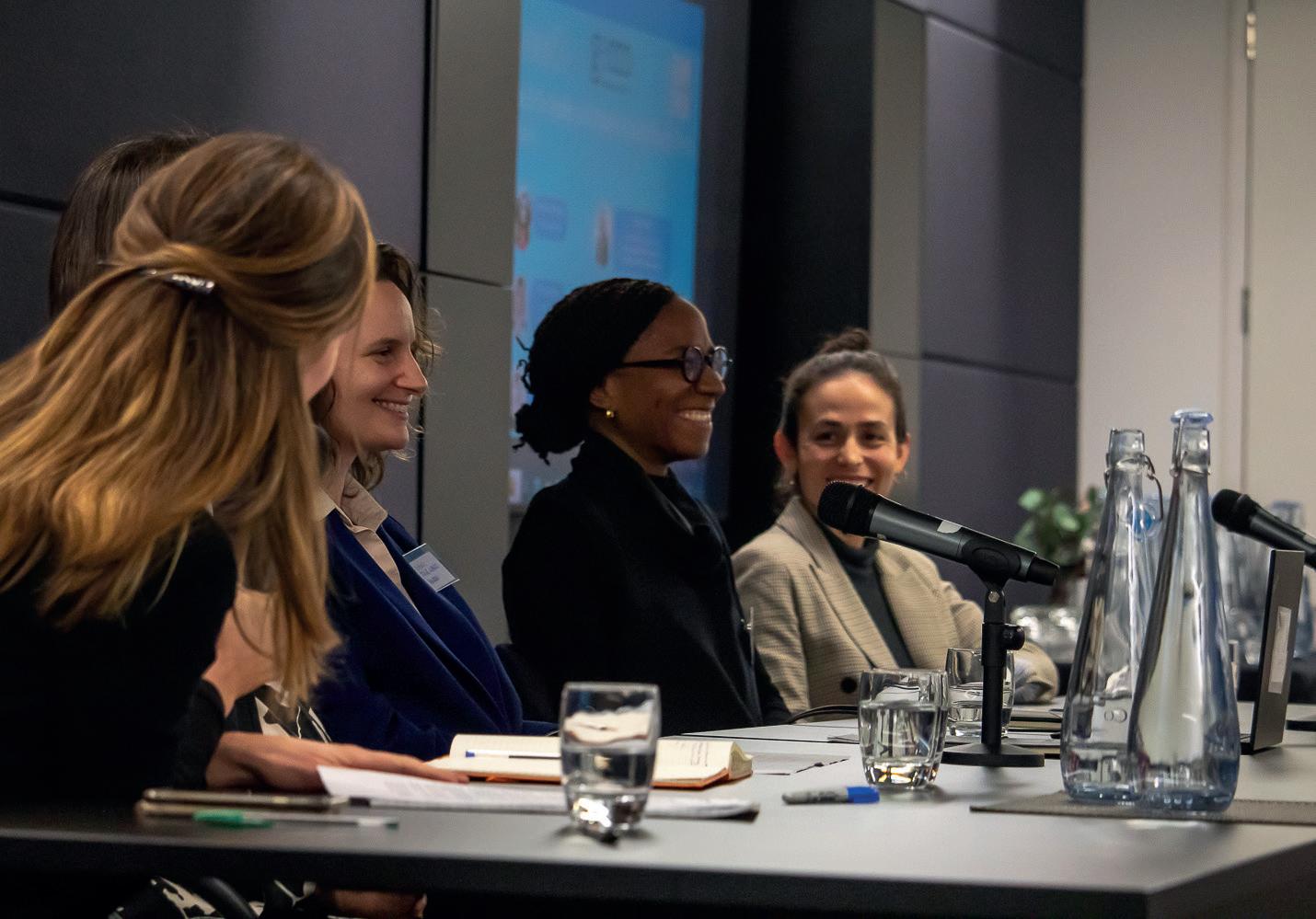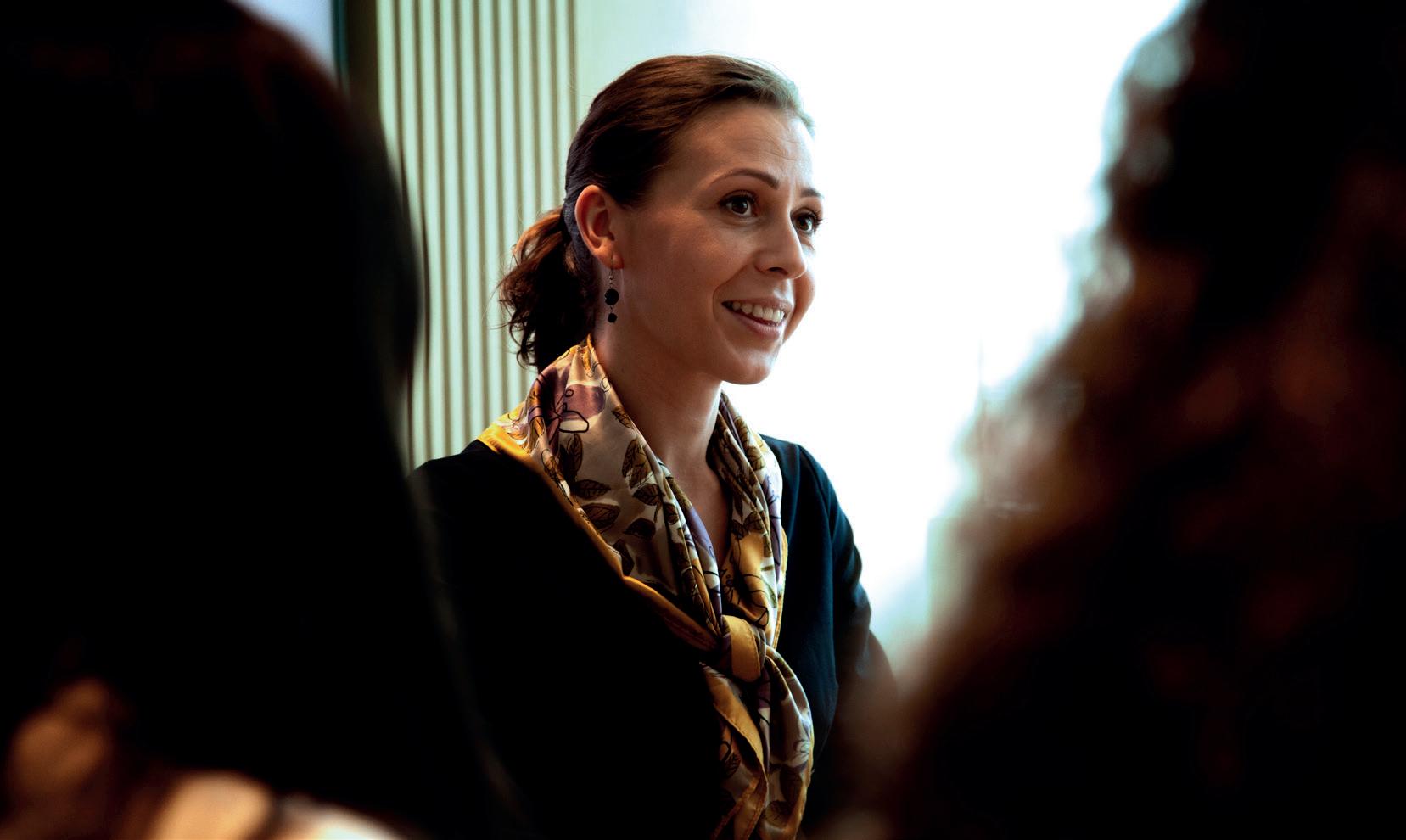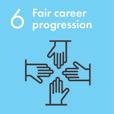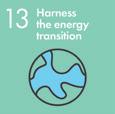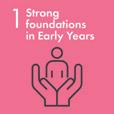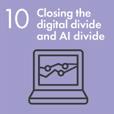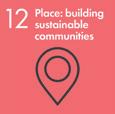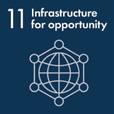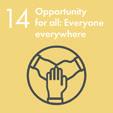3. Mapping Clyde & Co’s Activity Against the Purpose Goals
3.1 Goal 1: Strong Foundations in Early Years
Research demonstrates that, all too often, children from more disadvantaged backgrounds are already significantly behind their better-off peers by the time they begin school. A strong start in life is the cornerstone of social mobility, without which many children face numerous barriers to opportunity from the earliest stages of childhood.
3.1.1
Parental Leave
Recognising the importance of a child’s early years, in 2023 Clyde & Co introduced a new parental leave offering available to all colleagues, including Partners at the firm with at least twelve months of service. The new policy is designed to ensure that all colleagues are entitled to a consistent parental leave offering regardless of gender, so that they can take an active role in their child’s first weeks and months.
All Clyde & Co colleagues are entitled to 26 weeks of fully paid parental leave, regardless of gender or their parental role. The policy applies to both primary and secondary parents and carers, including adoptive parents. Colleagues with children in neonatal care are offered a further twelve weeks of paid leave, ensuring that parents of children who require greater support in their early childhood are able to be present for their children.
Colleagues are also supported by the firm when they return to work after parental leave through a range of measures put in place to support their transition into balancing work and family care. In addition to flexible working, Clyde & Co supports its colleagues to play an active role in their young children’s development by providing access to backup childcare provision and five days of paid emergency leave each year. Parental leave coaching is also offered to all colleagues to help them with their transition into parenthood, and to their managers to help break down biases and navigate the impact on the business.
In addition to flexible working, Clyde & Co supports its colleagues to play an active role in their young children’s development by providing access to back-up childcare provision and five days of paid emergency leave each year.
Strong foundations in Early Years
3.2 Goal 2: Successful School Years
School years are instrumental in a young person’s development, not only academically but also personally. However, research suggests that by the time disadvantaged young people finish secondary education there is a difference of around 19 months in learning between them and their peers2. Consequently, the so-called attainment gap between the most and least privileged remains stubbornly high.
3.2.1
School Outreach and Mentoring
Clyde & Co uses its position as a leading law firm with more than 10 offices across the UK to support educational projects in its local communities. Programmes which focus on providing children and young people with spaces to learn and develop valuable skills, often through play and outdoor learning, are targeted by the firm as ways in which it can assist young people to thrive.
‘Inspiring Young Lives’ is a central focus of Clyde & Co’s charitable work. The firm’s offices throughout the UK work in partnership with schools, colleges and community groups in their local communities to raise young people’s aspirations and develop skills which will prepare them for the world of work. The Stepney Green Mentoring Programme is an example of an initiative in which Clyde & Co colleagues use their experiences and expertise to provide valuable advice to young people. The programme mentors 16-18 year olds over a six-month period to provide career advice and help them develop employability skills prior to their transition into Higher Education or the world of work. In addition, the firm partners with Uptree, an organisation that tackles inequity of
opportunity for young people from low socioeconomic backgrounds, by providing insight days and experience of the legal sector for year 12 and 13 students.
Another example of Clyde & Co’s work supporting school-age children to achieve their full potential is its partnership with Go Beyond, a charity which gives young people from disadvantaged or challenging backgrounds the opportunity to go on free countryside breaks and take part in activities designed to build self-belief and raise aspirations. Clyde & Co primarily supports Go Beyond by fundraising, most recently working with Go Beyond to provide every child with a field study guide to enhance their outdoor learning throughout their break.
The firm’s work with schools and children focuses not only on academic and employability skills, but also on young people’s wellbeing. Clyde & Co works in partnership with the Schools Consent Project to send volunteer lawyers into local schools to teach 11-18 year olds about consent. Lawyers run interactive workshops on the subject of the legal definition of consent and provide guidance about disclosure to adults and other options in the event of an assault, with the aim of ensuring that young people are able to experience safe and positive interactions safe from sexual harm. Clyde & Co lawyers have worked with nearly 500 young people to date through its partnership with the project3
3.2.2
Literacy
Reading fluency is a vital skill for all young people. In addition to being essential for success in school and future employment. Research consistently shows that those who enjoy reading are more likely to have better self-esteem and mental wellbeing.
Clyde & Co colleagues are given the opportunity to volunteer to work with primary school children in in-person and online reading sessions as part of the firm’s local community volunteering programme. The sessions are either one-to-one or group storytelling sessions and are designed to foster in children a confidence and enjoyment of reading that will be a lifelong foundation as they progress into secondary and higher education. The programme was initially founded by Clyde & Co’s London office and has since expanded to cover ten more locations across the UK due to the initiative’s success.
Furthermore, Clyde & Co makes regular book donations to schools and local community firms to ensure that lack of finances does not act as a barrier to children and young people accessing the materials needed to develop their literacy skills and love of reading.
3.2.3
Not Beyond Redemption
Recognising that the firm’s colleagues have valuable legal expertise and skills to share, Clyde & Co works with the charity Not Beyond Redemption to help female prisoners in the UK retain links with their children during and after their prison sentence.
Evidence suggests that children who lose contact with a parent who is in prison are more likely to have reduced life outcomes or become offenders themselves. Clyde & Co lawyers work on a pro bono basis with Not Beyond Redemption to provide family law advice and help female prisoners to secure visitation for their children during their sentences, with the aim of re-establishing relationships between imprisoned mothers and their children.
Clyde and Co currently works with three prisons, HMP Styal, HMP Drake Hall and HMP Eastwood Park, to provide legal advice to female prisoners and plans to establish links with further prisons in the future to expand this work and help to improve life chances for children and young people.
3.3 Goal 3: Positive Destinations post 16+
Every young person should have the choice to pursue higher education, employment or training upon turning 16, regardless of their background or financial circumstances.
While young people becoming the first in their family to go to university is becoming an increasingly common occurrence, everyone is different and so making the right choices as a young adult is essential. It is vital that academic or non-academic routes, such as apprenticeships and T-Levels, are not blocked for those with the potential to pursue these paths.
3.3.1
Work Experience
Young people cannot aspire to careers or pathways that they do not know exist. For this reason, aspirational industries such as the legal profession are all too often unobtainable for young people from regions with limited opportunities. Clyde & Co recognises the role it can take in providing advice, mentoring and work experience opportunities to those from groups that are traditionally underrepresented in higher education and the legal sector.
Clyde & Co works towards achieving social mobility among school leavers through a range of early careers initiatives in partnership with local schools, teachers and universities. Through this work, the firm prioritises ensuring that those who are most in need of targeted careers advice and opportunities can be reached.
The firm also proactively works to eliminate barriers to a career in the legal profession for young people who face particular challenges in their lives. For example, as signatories of the PRIME commitment, Clyde & Co previously ran a work experience week called Bridge to the City, which was a five-day programme for Year 12 and first-year college students to gain insight into a career in law and enhance their employability skills, including a range of measures intended to widen access. Working with schools across London, in partnership with the organisation Uptree they were able to bring in 25 students for the programme from low socio-economic backgrounds. Participants’ travel and lunch costs were paid for by Clyde & Co, so that financial factors did not act as a barrier to taking part in the programme. The firm also encouraged and facilitated applications to the event from care-experienced young people and young carers, as these are both groups which are underrepresented in the legal profession. This programme has evolved to be part of Clyde & Co’s wider social mobility initiative, Legal Insight for Future Talent (LIFT), with aspirations to grow opportunities for students at this level of academia.
Clyde & Co’s work to share its advice and expertise on entering the legal sector continues once a young person has entered higher education. The firm has a number of campus ambassadors based at universities across the UK, who represent Clyde & Co and promote opportunities within the firm and wider legal industry to other students through social media and society events.
3.3.2 Apprenticeships
Clyde & Co has been recognised for its excellence in running apprenticeship schemes, having previously been the recipient of the People in Law Award for Best Apprenticeship Initiative. Society is increasingly understanding that university is not the correct pathway for every young person, and Clyde & Co’s industry-leading apprenticeship schemes provide young people who do not feel that university is the right choice for them with an alternative route into a legal career.
With apprenticeship schemes for school leavers covering a range of roles across its UK offices, including chartered legal executive and solicitor apprenticeships, Clyde & Co apprentices benefit from valuable opportunities to develop employability skills and an understanding of the legal profession through a more work-based training route.
The Solicitor Apprenticeship Programme is one example of Clyde & Co providing an alternative pathway into the legal profession for young people who do not wish to go to university. The six-year programme, which allows apprentices to be part of the firm’s day-to-day operations, leads to the apprentice becoming a fully-qualified lawyer upon completion of the programme. All Clyde & Co apprenticeships are partnered with a buddy at the firm, enabling young people to receive advice and support from experienced people within the industry to which they are aspiring.
Clyde & Co also offers apprenticeship programmes that begin at an earlier stage of a young person’s career. For example, the Administrator Apprenticeship Programme’s requirements include a minimum of 5 GCSEs, including Maths and English, meaning that young people can embark on a career in the legal profession straight from college. This apprenticeship often leads to an offer of full-time employment with the firm for those who complete the programme, demonstrating Clyde & Co’s commitment to helping young people enter and progress in the competitive legal industry. As well as young people the Administrator Apprenticeship Programme is also open to people at a later stage of their career who would like to make the change to the legal sector or for people getting back into work after extended periods away from the workforce.
Clyde & Co has also utilised part of their apprenticeship levy to fund six apprentices across four different Law Centres in London. Utilising the levy in this way was an opportunity to make use of unspent funds, allowing a greater number of young people interested in pursuing a career in law an opportunity to do so. The Law Centre apprentices sponsored by Clyde & Co are completing their Level 7 Solicitor Apprenticeship.
Clyde & Co also offers apprenticeship programmes that begin at an earlier stage of a young person’s career.
3.4 Goal 4: Right Advice and Experiences
Getting the right advice and experience at the right time in an individual’s career journey is crucial to achieving success and opportunity. Whilst school and academic work will always remain important, the benefits of mentoring, work experience, volunteering, travel and wider networking experiences to broaden minds and develop cultural capital and soft skills cannot be underestimated in ensuring that barriers to opportunity are broken down.
3.4.1 Legal Insight for Future Talent (LIFT)
The legal profession is increasingly recognising that the industry has for too long been inaccessible to people from more disadvantaged backgrounds, who lack the opportunities to gain valuable experiences and guidance on entering a career in law. Clyde & Co has responded to this issue by launching its outreach initiative, Legal Insight for Future Talent (LIFT), to address the lack of equitable access to opportunities in the legal sector.
LIFT has been designed to promote social mobility at Clyde & Co and in the wider legal profession through a range of events and initiatives which allow people from underrepresented groups in the legal sector to gain first-hand experience and insight into life at a law firm. Recognising that a person’s background can often act as a barrier to pursuing a career in the law, LIFT aims to raise aspiration and widen access by inspiring and supporting young people to enter the profession.
At the centre of LIFT’s work are LIFT Insight Weeks, which, in its inaugural year in 2024, welcomed
80 participants. Over the course of five days- three days of virtual workshops and panel sessions and two days in person in a nearby Clyde & Co officeparticipants have the opportunity to increase their understanding of the legal profession, receive advice on career planning and make valuable contacts. Every participant is paired with a mentor who works with them for one year to provide advice and share their experiences of entering and working in the legal sector.
The initiative is notable for its emphasis on eliminating traditional barriers to accessing the legal profession. There is no age requirement for taking part in LIFT Insight Weeks, with the programme valuing those with individual strengths and a strong enthusiasm for pursuing a legal career. Financial barriers are removed by paying each participant £500 for the week, which is above the living wage, as well as covering accommodation and travel expenses and providing laptops and technology for those who require them.
LIFT has a major focus on diversity, equity and inclusion. Insight Weeks are run twice a year, and each week is aimed at widening access to the legal profession to people from underrepresented groups. LIFT Social Mobility is open to those from lower socioeconomic backgrounds, with applications open to people who are from a low-income household, were eligible for free school meals, have been in care, are a carer, have been homeless or have had refugee or asylum seeker status as a child. The LIFT Black Heritage programme is meanwhile aimed specifically at those of black heritage. Through these initiatives,
which were described as being a valuable experience by 98% of participants in 20244, Clyde & Co is working to make sure that no one is excluded from a career at the firm because of their background or circumstances.
The decision to run three days of the Insight Week through virtual sessions is also significant, ensuring that participants living in remote locations or who have additional responsibilities, such as caring, are not prevented from making the most of this opportunity.
3.4.2 Bright Futures
Clyde & Co’s Bright Futures programmes provide underrepresented groups with another route into the legal sector. The five-day programmes offer participants the opportunity to shadow the firm’s experienced lawyers and gain a deeper understanding of life at an international law firm.
The Bright Futures Access programme is aimed at first year law students and penultimate year non-law students from lower socio-economic backgrounds, with applicants required to meet one of the set criteria, for example being from a low-income household or having experience of the care system. The Bright Futures Black Talent programme is aimed at those of Black or Mixed Black heritage, with the same entry criteria as the Bright Futures programme. Participants are paid a salary for the week, along with travel and accommodation expenses, to eliminate financial barriers to participating in the scheme.
Clyde & Co clearly demonstrates its commitment to extending opportunity to people from more disadvantaged backgrounds through its work with Bright Futures. The programme offers participants an alternative route into the legal profession, with participants assessed throughout the week and
the opportunity to take part in the firm’s Summer Vacation Scheme offered to those who excel. The design of the programme therefore supports social mobility by providing people from underrepresented groups with a route to progression at the firm.
3.4.3 Summer Vacation Scheme
Gaining access to and experience in the legal profession can be extremely difficult for those without the right advice or contacts. Clyde & Co’s Summer Vacation Scheme is designed to give participants the opportunity to spend two weeks working alongside experienced lawyers at the firm, usually within the department of the applicant’s choice.
The two-week scheme, which pays a salary, gives participants the opportunity to gain valuable experience within a working legal firm which would ordinarily be inaccessible to many aspiring lawyers. Opportunities provided during the Summer Vacation Scheme programme include attending court hearings, meetings and negotiations, observing cases, preparing research and attending networking events.
Clyde & Co ensures that its Summer Vacation Scheme participants have access to the right advice by pairing each individual with a dedicated supervisor and buddy who can share first-hand experience and provide guidance on work and interview preparation.
The Summer Vacation Scheme is one of the main routes to a training contract at Clyde & Co. Participants on the programme who are judged by the firm to have performed well over the course of the scheme can be offered a training contract at the firm, giving participants the opportunity for career progression.
3.4.4
Global Virtual Experience Programme
Another example of Clyde & Co’s work to make the legal profession more accessible for students and graduates is its Global Virtual Experience programme. The programme, which is run in partnership with Forage, is a modular virtual course which gives participants the opportunity to gain insight into life as a lawyer and gain experience within the industry which they can evidence on their CV.
The programme is made up of a series of simulated tasks designed by Clyde & Co lawyers to ensure that they are relevant to the work they do at the firm. The virtual nature of the programme is intended to eliminate any barriers to taking part, for example due to financial or geographic factors.
The Global Virtual Experience Programme further demonstrates Clyde & Co’s focus on creating opportunities within the legal industry to those from traditionally underrepresented groups, as people who complete the programme are 4.4 times more likely to be accepted on to further Clyde & Co training programmes5
3.4.5 Internship Opportunities
Clyde & Co is a proud Premier Member of The 10,000 Interns Foundation through which it offers paid internship opportunities to young people from underrepresented backgrounds. The Foundation champions underrepresented talent and promotes equity of opportunity, and the valuable experience provided by these internships opens doors to otherwise restricted career paths; indeed to date 10 interns have gone on to secure training contracts at Clyde & Co.
Clyde & Co also partners with DFN Project Search as a Host Business, where students with learning disabilities and autism spectrum conditions can complete yearlong supported internship programmes. With support from a tutor and job-coach, interns are offered rotations through different departments at Clyde & Co to gain invaluable insight into corporate work and ultimately with an aim for long-term paid employment in the future.
3.5 Goal 5: Open Recruitment
Open opportunities and recruitment are vital in ensuring that individuals can make the most of their potential. Progression in a career is important not only from the perspective of increasing earnings, but also to ensure that colleagues feel challenged and have the opportunity to develop their skills and knowledge.
3.5.1 Application Advice Hub
Clyde & Co employs more than 5,500 colleagues across more than 60 offices, recruited in four main business areas- lawyers, business services, legal support and paralegals. However, the application process to be recruited to a major law firm such as Clyde & Co can be daunting for those who have neither experience of the recruitment process nor contacts within the legal sector from whom to seek advice.
Applicants to positions within Clyde & Co are given access to online resources and videos to help them prepare for the firm’s hiring process through its online Application Advice Hub. This section of the Clyde & Co website provides advice on writing CVs and the different stages of the firm’s recruitment journey. Detailed guidance on the interview process at Clyde & Co is also accessible through the Application Advice Hub, particularly through a number of examples of competencybased interview questions such as those applicants may be asked during their interview.
By making this advice about its recruitment processes available to all, Clyde & Co ensure that there is a more level playing field when hiring to roles within the firm and that every applicant has access to the same information and tips, regardless of contacts within the firm or previous experience of the legal sector.
3.5.2 Early Careers Team
A dedicated Early Careers Team is tasked with supporting graduates and applicants to early careers roles at Clyde & Co with their first experiences of applying for a role in the legal profession. The firm demonstrates an understanding of the challenges aspiring lawyers can face when entering the profession by ensuring that the Early Careers Team is available as a point of contact throughout the recruitment process for those at the beginning of their legal career.
Clyde & Co has led the way in the legal sector in working to make the recruitment process as straightforward as possible for early careers role applicants. Working in partnership with assessment consultancy Cappfinity, the firm introduced an online assessment process that has reduced the application completion time by more than 50%6, resulting in a recruitment process designed to encourage new recruits to the legal profession rather than put candidates off applying for a role at the firm. The success of this new measure is evidenced through feedback from Clyde & Co applicants, with 93% reporting that they found the application format clear and easy to use7.
3.5.3 Paralegal Academy
In 2023, Clyde & Co launched its Paralegal Academy, which offers a new way for participants to build exciting future careers in its UK casualty practice, the largest in the UK. Recruits to this programme do not need any prior legal experience, and it seeks to attract a diverse range of applicants, with the majority roles being offered in Manchester and the Northwest. This Academy is further recognition that there is more than one path to a career in law.
3.6 Goal 6: Fair Career Progression
The chance to keep developing once in work and progress in a career is not just important from the perspective of increasing an individual’s earnings, but in helping colleagues continue to feel challenged and learn. Businesses that work out how to provide those opportunities to keep growing and moving forward will do better.
The Learning, Leadership & Talent (LLT) function at Clyde & Co aims to create a dynamic and inclusive learning environment. Through accessible, personalised learning and talent experiences, we support individuals to build skills and capabilities for rewarding and engaging careers.
3.6.1
Career Development Framework
Clyde & Co’s Career Development Framework outlines the standards and behaviours Clyde & Co colleagues should be demonstrating at each stage of their career with the firm, providing a transparent guide to career growth at the firm.
In order to ensure that colleagues are fully aware of the criteria they are expected to strive towards to progress at Clyde & Co, the Career Development Framework is made up of five key competencies, behaviours and characteristics colleagues are expected to demonstrate in order to successfully perform their role at the firm.
In addition to describing Clyde & Co’s expectations of its colleagues, the framework also ensures that colleagues at the firm are aware of the professional development opportunities they should make the most of if they wish to achieve career growth. The document affirms Clyde & Co’s commitment to rewarding colleagues based on merit, rather
than by longevity, and consequently ensures that colleagues understand how they can work to meet these expectations.
3.6.2
Professional Development
As a global law firm that strives for the highest standards, Clyde & Co actively encourages and supports its colleagues to develop their skills and grow within their roles. The firm invests in its colleagues’ progression by providing a range of career development opportunities, both in person and online.
Clyde & Co creates highly impactful learning solutions, leveraging technology to provide personalised and accessible learning content precisely when it’s needed. The MyDevelopment learning platform enables Clyde & Co colleagues to access this diverse and high quality learning content at the point of need.
In addition to these digital learning solutions, the LLT function design bespoke live learning opportunities to provide interactive activities, peer to peer learning and to elevate internal networks. Alongside this, Clyde & Co offers coaching provisions to support key diverse talent across the Firm.
Clyde & Co has more than sixty offices worldwide covering six continents and the firm uses its international reach to the benefit of its colleagues around the world. The firm’s Global Associate Programme (GAP) is designed to facilitate colleagues to work for one week from another Clyde & Co office, domestically or internationally. The programme gives colleagues the opportunity to build new relationships with their counterparts in other countries and share best practice which they can apply to their own roles and offices.
3.6.3 Leadership
Colleagues who wish to progress into leadership roles within the firm are supported by Clyde & Co to make the next steps into management through a range of leadership programmes targeted at specific goals and career pathways.
Clyde & Co offer two Harvard Management Development Programmes for their Business Services managers, which are available to join throughout the year. These global programmes provide managers of all levels and in any location the opportunity to develop their management and leadership skills. Using a blended approach, they offer high quality Harvard Business School digital learning modules, supported by live interactive sessions to give managers the opportunity to discuss topics in more detail and build a network of likeminded colleagues across the Firm. The programmes focus on relevant topics such as leading people, delegation, goal setting, coaching and innovation.
Other examples of global leadership programmes made available to Clyde & Co lawyers are the Senior Leadership Experience Programme, the Senior Associate Development Programme and the Associate Development Programme. Each of these programmes focus on developing leadership capabilities to ensure that colleagues are equipped with the right skills, tools and experience for the future and their career ambitions, aligned with the firm’s strategy. They also focus on other key topics for lawyers such as business development and commercial acumen, financial management, career planning and emotional intelligence.
By attending these programmes, delegates benefit from deepening their leadership skills, accelerating performance and progression and developing their internal networks across the Firm.
In addition to these programmes, Clyde & Co also offers support with career progressions into leadership roles by running career milestone inductions for Legal Directors and Salaried Partners. These provide opportunities to support the growth of meaningful, future focused careers.
3.6.4 Mentoring
Mentoring is promoted at Clyde & Co as a way of sharing advice and best practice and supporting career progression. Access to high-quality mentoring is often vital for career development, enabling colleagues to build relationships and contacts, receive advice and share and discuss experiences.
The firm launched a new mentoring initiative in 2021 in collaboration with Guider to make accessing high-quality mentoring a more straight-forward process for its colleagues. Recognising that previously having to seek out advice on finding a mentor within the firm dissuaded many from making the most of the opportunity to be mentored, Clyde & Co’s new mentoring scheme ensures that every colleague has equal opportunities to be mentored by using technology to match them with a mentor that suits their needs and career goals.
3.7 Goal 7: Widening Access to Savings and Credit
A lack of access to savings and credit is one of the major barriers to opportunity. Whether it’s being able to afford day-to-day essentials and housing or putting money aside for retirement, managing money and getting good advice can make all the difference in being able to make the most of their potential.
3.7.1 Free Legal Clinics
With the UK facing a cost of living crisis, accessing legal advice when needed is often out of reach for many people. In order to address this issue, Clyde & Co utilises the experience and expertise of its highly qualified lawyers to provide pro bono legal advice in its local communities.
Clyde & Co lawyers run weekly advice clinics in partnership with charities in community advice centres across the UK, including in London and Manchester. These clinics are targeted at areas which have an unmet legal need and are designed to support people who cannot afford legal representation to understand the legal system and receive advice about their rights and case.
3.7.2 Financial Wellbeing
As part of Clyde & Co’s financial wellbeing offering, colleagues can access various benefits to help with savings and financial advice. Along with offering a pension scheme, Clyde & Co also offers pension guidance meetings where colleagues can discuss short and long-term pension savings goals with an external provider. Colleagues also have access to Mortgage Advice provided by the firm for advice when arranging mortgages, and an Employee Assistance Programme is also available to discuss any issues, including relating to debt management.
The firm provides Life Assurance and Income Protection for colleagues, and also allows colleagues to purchase additional levels of cover at firm negotiated rates should they choose to.
Clyde & Co also offers benefits which allow colleagues to spread the cost of the benefit over a fixed time period, in particular the Cycle to Work Scheme and train Season Ticket Loans.
Widening access to savings & credit
Good health and well-being
3.8 Goal 8: Good Health and Wellbeing
Good health and wellbeing are often a precursor to a person being in a position to make the most of their talents in education, training or in work.
Health inequalities across the UK persist and have significant impact on wider life. The statistics on diverging life expectancy give a clear sense of how communities even living side by side can have very different outcomes.
3.8.1 Employee Wellbeing
Clyde & Co demonstrates a strong commitment to building a supportive working environment in which its colleagues are able to balance both their professional and personal lives. In the firm’s most recent annual engagement Global Have Your Say survey, 71% of respondents agreed favourably with Clyde & Co’s work to promote positive work life and wellbeing practices8
As part of the firm’s health coverage and wellbeing offering, colleagues can access various benefits including Health Coverage via private medical schemes, health cash plans and health screenings, as well as Digital GP Services which provide access to GP services.
To ensure that every colleague has access to health and wellbeing support when needed, Clyde & Co has a range of Wellbeing Officers, as well as a dedicated Health and Wellbeing Advisor, within its offices who can act as first point of contact to those who require additional support in addition to the traditional forms of Employee Assistance Programmes (EAP) and private medical insurance (PMI). The Health and Wellbeing Advisor is also responsible for creating the global health and wellbeing strategy through
the promotion of wellbeing initiatives globally throughout the firm, with the aim of making sure that support is accessible to every Clyde & Co colleague.
Clyde & Co colleagues are invited to attend and participate in a number of events and initiatives throughout the year designed to facilitate open discussions about wellbeing and work-life balance. In January 2024, the firm held a Reset and Recharge webinar with the aim of helping its colleagues to consider how they could prioritise their wellbeing over the coming year, while the firm’s Nutrition and Hydration Week focused on the link between diet and hydration with performance, productivity and wellbeing.
Wellbeing events are also targeted at specific groups within the firm to ensure that colleagues receive the right advice for their specific circumstances. Clyde & Co ran a ‘Wellbeing for Parents’ event in the 2024 summer holidays to provide advice on balancing work with being a parent. Wellbeing for Carers sessions are also held for those who have responsibilities supporting other adults and/or children and who wish to receive advice on how to maintain their own wellbeing needs.
Clyde & Co is a member of the Mindful Business Charter, along with a number of other firms worldwide. The Charter promotes flexible and supportive wellbeing practices that suit the needs of the people that make up a firm. Initiatives such as its 26-week fully paid parental leave policy and additional support measures to assist parents with their transition back to work are evidence of Clyde & Co’s continually evolving work to create a culture at the firm which is mindful of the wider needs of its colleagues. Plans are also in place to introduce a formal flexible working scheme to further promote work-life balance at the firm.
Furthermore, Clyde & Co offers its colleagues globally a Wellbeing Day off work each year, in addition to the annual holiday entitlement, so that colleagues can prioritise their wellbeing.
3.8.2 Mental Health
Clyde & Co has a range of measures and initiatives in place to ensure that the fast-paced and pressured nature of working at a major legal firm does not come at the expense of its colleagues’ mental health and wellbeing.
Throughout the year, the firm holds a number of events to coincide with national and global awareness days with the aim of fostering a working environment in which colleagues feel comfortable and supported to have open discussions about their mental health. For example, Clyde & Co held a series of events on World Mental Health Day 2024 with the theme of ‘It’s time to prioritise mental health in the workplace’. In addition to webinars and blogs in which colleagues were encouraged to share their experiences of mental health to normalise conversations on the topic, colleagues were also invited to take part in a virtual office chair yoga session to promote wellbeing in the office.
The theme for Mental Health Awareness Week in May 2024 was around movement, as part of which Clyde & Co hosted a webinar that explored the science behind the joy of movement and how that improves mental health. Virtual 30-minute yoga sessions were also offered, together with a reminder of the Benefits platform and discounts available to colleagues on movement related items. This was followed by a roundup of webinar recordings and all the health & wellbeing resources available.
To coincide with World Suicide Prevention Day 2024, Clyde & Co held a Legal Wellbeing event to focus specifically on mental health and wellbeing in the legal profession. The event aimed to give participants the opportunity to share ideas and insights into mental health in the legal sector and to identify ways in which Clyde & Co and other legal firms can take their work in this area further.
Men’s mental health is often a particularly challenging issue to address, with many men often reluctant to share concerns about their mental health experiences. Clyde & Co launched Clyde and Mo, a wellbeing initiative specifically designed to encourage its male colleagues to seek advice and support around their mental health and remove the stigma often attached to the subject. The firm has invited speakers, including Jason Robinson, the first black captain of the England Rugby team, to speak to colleagues at the firm about their own experiences struggling with mental health to open up dialogue around this topic. In June 2024, Clyde & Co supported Men’s Health Week by opening up the conversation around mastering health which covered several bite size chats around stress and burnout, physical health such as sleep, movement and nutrition as well as how to support one’s self and others.
Mental Health First Aiders are present in Clyde & Co’s largest UK offices to ensure that mental health support is accessible to any colleagues who require additional assistance. Originally introduced in the firm’s London office in 2019 and later expanded to other offices across the country, volunteer Mental Health First Aiders at the firm are trained to recognise signs of mental health issues and act as a point of contact for those who require support.
Clyde & Co’s Employee Assistance Programme is another example of support available to the firm’s colleagues and their families, providing free and confidential advice on a range of issues that may impact a person’s mental health at home or at work, including finances, family care, relationships and emotional distress.
Clyde & Co held a series of events on World Mental Health Day 2024 with the theme of ‘It’s time to prioritise mental health in the workplace’.
Extending enterprise 9
3.9 Goal 9: Extending Enterprise
Bringing opportunities to communities and having more jobs on the doorstep is often discussed in terms of inward investment and promoting firms investing in places that have traditionally been social mobility coldspots. However, enabling people and communities to create their own jobs is perhaps the most powerful way of really driving opportunity on the doorstep.
Traditionally there are some people and places that have tended to create more new companies and the opportunities that
come with that. If we can embed a social norm of entrepreneurship across our country and in communities where setting up a business is less common, then it can be a powerful lever to help talent and ideas thrive wherever they are.
Starting in 2025, Clyde & Co will be working on a project to provide 12 months of free legal and other professional support to Greentech startups from various university startup hubs and incubators across the UK, where the firm’s exceptional risk navigation skills will be valuable to help earlystage ventures achieve commercial success.
3.10 Goal 10: Closing the Digital Divide
The digital and AI divide is one of the major barriers to opportunity. The recent shifts in working patterns have starkly displayed the impact of the digital divide.
For some people it is about having poor access to the internet or broadband in the first place. In other cases, people and communities might have access to good broadband but not be able to afford a device or the necessary hardware to work and learn on. They may find it hard to afford the data that is needed to study or work at home. For other people a lack of skill set or confidence with AI are major issues.
The digital and AI gap is a gap we have to close if we are to enable equality of opportunity. The internet revolution is an opportunity for a level playing field but it also poses a growing inequality threat for those who cannot take advantage of an online world.
3.10.1 AI
One of the most significant recent developments in technology is Artificial Intelligence (AI), which is revolutionising the way in which businesses and firms are operating across all sectors.
Clyde & Co has positioned itself as a leader on the use of AI in the legal sector. The firm has embraced the use of AI so that it can offer its clients comprehensive advice and guidance on using AI to advance their business and navigating the risks and regulations of this new technology.
Developments in AI technology are shared and discussed on Clyde & Co’s Embracing AI podcast, which features industry specialists to facilitate conversation about the impact of AI across a multitude of sectors.
Furthermore, as part of the firm’s International Women’s Day celebrations in 2024, the Chicago office hosted one of the world’s pioneers in AI ethics, Kay Firth-Butterfield. Kay was Head of AI and Machine Learning at the World Economic Forum for five years and was awarded the 2024 Time100 Impact AI Award for her work in the field of responsible AI. Kay participated in a fireside chat, available globally, with Eileen King Bower, Chair of Clyde & Co’s North American Board, about her career to becoming a leading expert in responsible AI, her experiences of being a woman in leadership, managing the risks of AI and the importance of eradicating bias from AI data.
3.11 Goal 11: Infrastructure for Opportunity
A lack of good infrastructure can be a significant barrier to opportunity. For communities with less opportunity on the doorstep, being able to find opportunities where they live is essential. That is why investment in the roads and railways that connect people with opportunities matter so much, unlocking people’s chances to aim for roles that might not be on their doorstep but can advance their careers.
With the growing trend of hybrid working, both from home and in the office, there is a real chance to lower the physical barriers to people being able to apply for jobs that are not right on their doorstep, but infrastructure for opportunities remains vital.
Clyde & Co regularly considers its approach to hybrid working, primarily taking into account what colleagues want but also reviewing what the wider legal professional services sector and clients are doing. Currently colleagues work from the office for at least two days a week, but can also discuss any personal arrangements around accessibility or otherwise with their managers and the HR Team.
Clyde & Co has a large network of office premises across the UK, ranging from Southampton to Aberdeen, so colleagues and prospective candidates have opportunities to work from locations that are closer to home.
3.13
Goal 13: Harnessing the Energy Transition and Net-Zero
The transition to Net Zero in Britain is a unique opportunity to see new careers and roles in the very places where they can make the most difference.
As we progress further with the energy transition it will become an ever more fundamental part of the debate on levelling up. Investment in the green economy is already bringing brand new opportunities to areas across the country, and it is crucial that the transition is one that is equitable for people and communities everywhere.
Clyde & Co’s Chief Sustainability Officer, Paddy Linighan, was recognised in The Lawyers Hot 100 2024 list in recognition of his work in this area.
3.13.1 Sustainability
Clyde & Co strives to play a leading role in driving sustainability within the legal sector. The firm recognises the role it has to play in ensuring that the legal profession adapts to the move towards a sustainable and green economy and is committed to reducing the impact of its work on the environment through a range of areas, including carbon emissions, energy usage, waste and water usage.
In order to drive this agenda forward, the firm has created a new position within the firm of Chief Sustainability Officer, alongside growing its sustainability team to further advance this work. Clyde & Co’s Chief Sustainability Officer, Paddy Linighan, was recognised in The Lawyers Hot 100 2024 list in recognition of his work in this area. One example of the work the firm is doing to promote sustainability across the legal profession is its membership of the Legal Sustainability Alliance, a collection of law firms working in collaboration to advance sustainable practices in the legal sector. The firm is also a founding member of the Net Zero Lawyers Alliance and a signatory to Legal Charter 1.5.
Clyde & Co has also converted all of its corporate credit facilities into Sustainability Linked Credit Facilities, the first law firm to do so.
3.13.2 Net Zero
Recognising that the biggest sustainability challenge facing Clyde & Co is in reducing its carbon emissions, the firm has implemented a Global Environmental Policy to outline its plans to reduce this impact which is published on their website.
Clyde & Co has committed to achieving Net Zero emissions by 2038. This ambitious target has been developed through the Science Based Targets Initiative (SBTi), with plans validated by SBTi in 2024 to reduce Scope 1 and 2 greenhouse gas emissions by 80% by 2030 from the firm’s 2019 levels and to reduce Scope 3 emissions by 50% in the same timeframe. The firm’s progress towards meeting these goals is tracked by collecting carbon emissions data to build a clear picture of the efficacy to date of its work to achieve Net Zero. There is a commitment to report on this progress each year to ensure transparency and a transition plan further outlining the work to be undertaken in the pursuit of Net Zero will be published by May 2025.
Transitioning away from fossil fuels is an important aspect of the firm’s work to adopt sustainable practices. In 2019, the firm committed to using 100% renewable electricity across its UK offices by 2025 by signing the Legal Renewables Initiative. They achieved this in 2023. An energy efficiency programme is also being developed for each UK office to focus on reducing energy and water use.
In addition to the work done at board level, Clyde & Co’s colleagues are essential in the firm’s efforts to achieve Net Zero. For this reason, the firm launched its Zero as one campaign, which is designed to raise awareness and encourage participation among colleagues towards the firm’s Net Zero goal. The campaign provides colleagues with access to a range of educational materials, initiatives and practical tips they can implement to reduce their environmental impact in the office, in their daily life when travelling to and from work, and in the work they do with clients.
Clyde & Co’s UK offices benefit from best practice in the firm’s other offices around the world. For example, Clyde & Co colleagues in Australia have access to an Electric Vehicle subscription plan as part of their salary package to incentivise the use of EVs to reduce their car journey emissions when travelling to and from work. The firm’s UK offices are now looking to launch a similar scheme so that its UK-based colleagues can reduce the environmental impact of their travel.
3.13.3 Sustainable Procurement
With 95% of Clyde & Co’s total greenhouse gas emissions made up of Scope 3 emissions9, it is clear that the procurement of goods and services can have a significant impact on the firm’s sustainability practices. It is for this reason that Clyde & Co has created its Sustainable Procurement Policy (published on their website), which applies to all procurement activities undertaken by the firm, including acquisition of goods and services, selection of suppliers and management of contracts, and is designed to ensure that suppliers’ procurement practices are in line with Clyde & Co’s values. The policy sets out Clyde & Co’s approach to sustainable procurement and its expectations for each of its suppliers and sub-contractors who are expected to comply with the policy.
Suppliers to Clyde & Co are expected to provide data and information on their own sustainability and are encouraged to publicly commit to setting and reporting on a Net Zero goal for reducing their own greenhouse gas emissions to demonstrate year-on-year progress.
The firm continuously reviews and assesses its suppliers’ work on achieving sustainability. Those that are found to be performing well in specific areas such as social enterprise and sustainability are more likely to be invited again to tender for the firm. This ensures that Clyde & Co works with partners who are engaged with the firm’s efforts to work towards achieving Net Zero and share the firm’s high standards in this area.
Achieve equality, through diversity & inclusion
3.14 Goal 14: Achieve Equality through Diversity and Inclusion
The research is clear that more socially diverse companies make better decisions because they have a wider perspective and avoid groupthink. The work of the Hamilton-Alexander Review has been pivotal in opening up more opportunities in the most senior roles for women and the Parker Review has a similar focus on ethnic minorities, but there is a long way to go.
When we look across leadership roles in business, the judiciary, government and politics, there is a continued skew towards those from the most privileged backgrounds. Britain will not succeed unless and until its leadership roles better reflect wider society at large.
3.14.1 Inclusivity
At the heart of Clyde & Co’s efforts to promote diversity, equity and inclusivity within its workplace is an ambition to create an inclusive environment which celebrates its colleagues’ differences. The firm recognises that having a diverse workforce is essential to achieving greater results and successes. With ‘celebrate difference’ one of Clyde & Co’s core values and the firm ranked in the top 75 in the U.K.’s Social Mobility Employer Index four years in a row, promoting inclusivity is a clear priority for the firm.
A number of initiatives and measures are in place at Clyde & Co with the aim of ensuring that all colleagues feel able to thrive and to be themselves while at work. For example, the introduction of a menopause policy, a new parental leave policy which gives all colleagues
26 weeks fully paid leave regardless of gender or parental role (see Section 3.1) and information and resources on women’s health topics such as menstruation and endometriosis are all designed to support women within the workplace.
Clyde & Co’s commitment to celebrating women within the firm was marked through a number of events held to coincide with International Women’s Day. Talks, panel events and a talk from UNICEF were all organised to celebrate the day, which had the theme in 2024 of ‘inspire inclusion’. A celebratory breakfast for women was also held on the day to promote a welcoming environment for the firm’s female Partners, colleagues and clients.
The majority of those in the legal sector in the UK are from White British backgrounds and those from different racial or ethnic backgrounds are traditionally underrepresented.
Clyde & Co seeks to ensure that its offices and workplaces are inclusive and welcoming environments for colleagues from all ethnic backgrounds. Along with the LIFT program (see Section 3.4), which aims to promote opportunity within the legal profession to people from diverse backgrounds, the firm hosts a number of events, including panel and speaker events involving colleagues and external parties, in person celebrations, publishes colleague-written blogs and thought leadership pieces and supports external initiatives focused on underrepresented groups.

National and international celebrations of culture and heritage are celebrated in Clyde & Co’s UK offices to help ensures that colleagues from all ethnic backgrounds feel valued and welcome within their workspace. Occasions such as South Asian Heritage Month, Latin Hispanic Heritage Month, Lunar New Year, Diwali, Eid, Islamophobia Awareness Month and Black History Month were all acknowledged during 2024. The events for Black History Month included workshops on Black hair to highlight hair discrimination and the firm’s commitment to the Halo Code and a panel event was held for Islamophobia Awareness Month where internal and external speakers were able to share their experiences as members of the Muslim community.
Clyde & Co works to achieve an accessible and welcoming environment for its disabled colleagues. Acknowledging that there is more the firm can do to support disabled people within the firm, it introduced a global accessibility policy which allows the firm to support those with a disability, neurodiversity or long-term condition by enabling it to consider and implement appropriate adjustments in a way that is consistent, centralised and compassionate , regardless of location. Clyde & Co has also recently completed an audit, in conjunction with the Business Disability Forum, to analyse in detail the accessibility of its UK offices
through site visits, reports, surveys and focus groups. This work has generated a range of improvements in accessibility and community that the firm are looking to implement.
All of the above-mentioned work is done in partnership with the firm’s Inclusion Networks (employee-led resource groups), whose goal is to provide a space for colleagues to come together in support of a diversity topic, whether as a member of a community or as an ally. Current networks focus on gender equality; disability, neurodiversity and accessibility; LGBTQIA+ experiences; cultural, ethnic and religious diversity; and parents and carers support. These networks also raise awareness through events and communications, and advance the diversity, equity and inclusion agenda, promoting greater respect and inclusion for everyone at Clyde & Co. The networks are encouraged to collaborate externally as well, for example ‘Pryde & Co’, our LGBTQIA+ and allies network, collaborated with Trans in The City to present a 4-part podcast series for Trans Awareness Week 2024. The episodes covered personal transitioning journeys, healthcare challenges, workplace inclusivity, and effective allyship. This initiative aimed to break down barriers and foster a more inclusive and supportive environment, encouraging Trans legal professionals to thrive and succeed in the workplace.
3.14.2 Representation and Diversity
Leadership roles in businesses, government organisations and politics in the UK are traditionally held predominantly by those from the most privileged backgrounds. Clyde & Co recognises the importance of having people in leadership roles who represent the firm and the regions it represents as a whole.
The firm’s DEI strategy for 2030 has been introduced to focus on the areas which Clyde & Co can target to create a more diverse workforce. By reviewing its goals set in 2022 and replacing them with more challenging and wide-reaching goals, Clyde & Co demonstrates its commitment to leading the way on fostering diversity, particularly in leadership roles so as to ensure that different cultures and backgrounds are represented at the highest levels.
Specifically, Clyde & Co has adopted a ‘gap to parity’ approach for goals which will increase diversity within roles at the firm. By 2030, the firm aims to have reduced the overall representation gap to ethnicity parity across the firm by 30% and to reduce the representation gap to gender parity at all levels, including decision-making levels, by 50%. Clyde & Co’s UK offices also work with Diversity Lab to focus on the Mansfield Rule certification and to strive to consider more women, underrepresented racial and ethnic groups, LGBTQIA+ people, people with disabilities and those from lower socio-economic backgrounds for senior leadership roles and business development opportunities.
In March this year Clyde & Co also launched a new global sponsorship programme for women partners to reach its most senior equity partner roles. With a much slower progression rate compared to other roles, in 2024 Clyde & Co worked with an external consultancy to carry out a series of internal interviews and focus groups across the firm to help understand what barriers may exist to diverse talent progressing within the firm, and this sponsorship programme was one of the interventions recommended to help overcome some of the barriers identified. The overall aim of the sponsorship programme is to support the participants to consider and realise their route to senior equity partner, as well as provide them with the tools, knowledge and safe space in which to make an informed decision about their career path. Clyde & Co also plan to implement further interventions as recommended by the report to support further diverse talent to progress at Clyde & Co at the same rate as their counterparts.
At a wider level, Clyde & Co’s careers team works with a number of firms to ensure that its talent pool is as diverse as possible. The firm works with the Bright Network, Aspiring Solicitors and has launched the Clyde & Co Academy, all of which are aimed at supporting people from underrepresented ethnic backgrounds to succeed within the legal profession.
In March this year Clyde & Co also launched a new global sponsorship programme for women partners to reach its most senior equity partner roles, where only 22.1% are women (as of 1 May 2024).
3.14.3 Pay Gap
Clyde & Co reports annually on its gender pay gap between male and female colleagues and partners at the firm. Clyde & Co also opts to report annually on its ethnicity pay gap between colleagues from underrepresented ethnic backgrounds and its white colleagues. This ensures transparency and a commitment to reduce the gap year-on-year in the pursuit of gender and ethnicity equality throughout the firm.
In 2023, the combined partner and colleagues gender pay gap stood at 48.1%, an improvement from 50.7% in the previous year10. The colleagues ethnicity pay gap stood at 29.1% in 2023, also an improvement from 33.3% in the previous year11 While this represents a continued improvement year-on-year at the firm and in line with other law firms that publish the data, the firm acknowledges that the pay gap remains too high and that there is further work to be done. Clyde & Co’s total partner gender pay gap also decreased in 2023/24.
15 Working in Partnership
3.15 Goal 15: Working in Partnership
Only by firms working in partnership can potential truly be recognised and opportunity boosted.
By fostering strategic alliances with unions and citizens assemblies, firms can harness diverse talent and perspectives, and ensure their initiatives are grounded in the needs of real-world communities.
3.15.1 Charity and Pro Bono
Clyde & Co colleagues, both legal and non-legal, have a wealth of skills, expertise and experiences which can be used to the benefit of those who most need assistance. The firm works in partnership with a number of charities and community organisations to establish how its colleagues can best utilise their talents to make a valuable contribution to society.
The firm has long-standing relationships with community organisations across the UK in the places where there is the most unmet need. Weekly legal advice clinics are run from community advice centres in cities such as London and Manchester, often in collaboration with Citizens Advice. Through this work, Clyde & Co colleagues work in partnership with the communities they serve to extend access to and reduce inequalities in legal representation to those who are unable to afford it due to financial barriers.
In 2024, Clyde & Co saw a 44% increase in pro bono project participation and colleagues contributed 19,898 hours of pro bono work12
The firm’s pro bono and non-legal volunteering programme focuses on three key areas: inspiring young lives, equality before the law and sustainability and climate change- and the firm plans to expand its charitable contributions in these areas further by pledging at least 10,000 volunteering hours over the next three years to address climate change and biodiversity loss, along with another 10,000 pro bono hours to the Global Refugee Forum Legal Community Pledge to support access to legal assistance for refugees and displaced people.
A charity partnership with Go Beyond focuses on supporting children and young people by providing educational programmes that help them to succeed in their early years. Clyde & Co helps to provide children in the Go Beyond programme with the resources they need to thrive and make the most of their experiences with the charity.
Voluntary work carried out by the firm’s colleagues includes Clyde & Co’s primary school reading schemes. Carried out both in-person and virtually in partnership with schools across the UK, colleagues at the firm support children to improve their reading skills and self-confidence by volunteering time to these projects.
Not Beyond Redemption is an example of how Clyde & Co partners with other firms to use its lawyers’ legal skills and experience to assist those most in need. This initiative involves the firm’s legal colleagues volunteering to support female prisoners in the UK with understanding their family law rights and to support them in seeking access to their children during and after their prison sentence. Originally in Manchester, the firm’s support of the project has been expanded to various locations around the UK so that Clyde & Co’s colleagues can use their expertise for the good of their local communities in helping to reestablish relationships between incarcerated mothers and their children.
3.15.2 Diversity, Equity & Inclusion (DEI)
Clyde & Co recognises that for real progress across the various diversity, equity and inclusion challenges we all face, it must work together with industry peers, clients and other external firms, some of whom have already been mentioned earlier in this report.
Through its work in the Insurance sector, Clyde & Co is a member of the Association of British Insurers (ABI) and is part of their DEI Network. The ABI has commended Clyde & Co’s work in the DEI space, in particular requesting to publish a case study about the LIFT programme as a good example of progressing social mobility. Clyde & Co is also a sponsor of iCAN, the Insurance Cultural Awareness Network, which focuses on underrepresentation of minority ethnic groups across insurance in the UK.
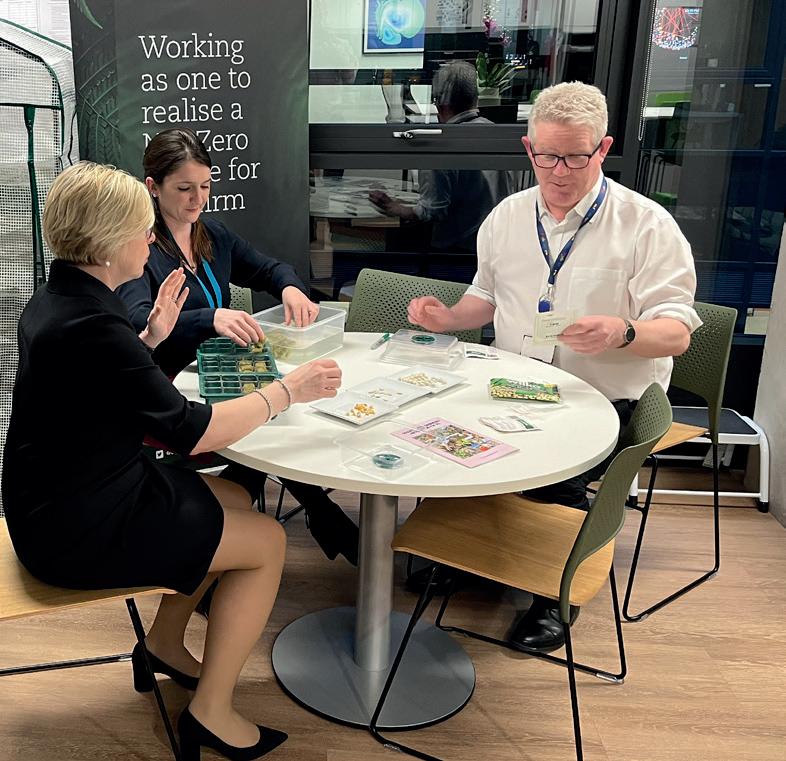
Clyde & Co is an ‘Employers for Carers (EfC)’ member with Carers UK, the leading national charity for unpaid carers, and as part of this, the firm is proud to have achieved ‘Carer Confident’ accreditation which recognises employers who build a supportive and inclusive workplace for people who are, or will become, carers, and empowers them to make the most of the talent they bring. This also serves as an important demonstration of the firm’s commitment to providing a best in class working environment for carers.
Other examples include Clyde & Co being a proud Global Diversity Champion with Stonewall in the UK and extending its support for the LGBTQIA+ community across other regions in which it operates. Similarly, Clyde & Co has a global partnership with the Business Disability Forum (BDF), to support workplace disability and neurodiversity inclusion and accessibility. The firm recently tasked the BDF to complete a full accessibility audit across its UK premises and will also be embarking on a digital audit. The firm is also committed to the Disabilty Confident Scheme.
4. Analysis
In addition to its exceptional reputation as an international law firm, making a positive contribution to the people both within its offices and in the communities it serves is at the heart of the work that Clyde & Co does. The firm demonstrates a strong commitment to using its position within communities across the UK as a force for good in breaking down barriers to equality and opportunity, particularly within the legal profession.
4.1 Colleagues
Clyde & Co understands that its colleagues are an essential part of its work, both as a legal firm and as a force for good in the wider community. The firm invests in its colleagues’ career progression and personal wellbeing to ensure that all Clyde & Co colleagues are supported to progress and thrive in the workplace.
By providing a wide range of professional development opportunities, Clyde & Co supports its colleagues to develop required skills to enable them to achieve their career goals.
Clyde & Co colleagues are also invited to take part in mentoring programmes, with the sharing of advice, experiences and best practice encouraged by the firm to promote a supportive and collaborative working environment in which its colleagues can learn and grow. The firm also leads by example in supporting its colleagues to progress into leadership and management roles, with its tailored programmes designed to support underrepresented groups within leadership positions particularly notable.
Despite the legal profession being notoriously fast-paced and high-pressured, Clyde & Co’s duty of care towards its colleagues’ mental health and wellbeing stands out. The positive feedback of colleagues regarding the firm’s work life and wellbeing practices are testament to the way in which Clyde & Co supports its colleagues to thrive in all aspects of their lives through a strong framework of mental health and wellbeing support. The firm also demonstrates its commitment to fostering a welcoming and inclusive environment through celebrations of national and international days around different religions and cultures.
4.2
Pro Bono and Community Work
With offices spread across the UK, Clyde & Co ensures that it contributes to the communities in which it is based by using the knowledge and expertise of its colleagues to positively impact the lives of local people. The firm’s 19,898 hours of pro bono work in 2024 evidence its commitment to leading the way on social impact.
Weekly legal advice clinics held throughout the UK and work with Not Beyond Redemption to support female prisoners retain access to their children enable Clyde & Co lawyers to use their legal expertise to bring about positive change in the lives of those who are often prevented from accessing legal advice and representation due to financial barriers. By widening access to the justice system to people in the communities they serve, Clyde & Co evidences its dedication to breaking down barriers to social mobility and equality.
In addition to offering pro bono legal advice, Clyde & Co’s wider work within its local communities, including work to raise young people’s aspirations as part of the Stepney Green Mentoring Programme or enabling disadvantaged young people to go on free countryside breaks, has a significant positive impact on the lives and outcomes of people across the UK.
4.3 Widening Access to the Legal Profession
Clyde & Co takes seriously the role it has to play in widening access to the legal profession and eliminate barriers that prevent those from underrepresented groups from pursuing a career within the industry. The firm demonstrates this commitment by participating in a number of programmes and initiatives designed to promote greater equality and diversity within the legal sector.
In addition to projects such as Bridge to the City, Bright Futures and its Summer Vacation Scheme, which support school students and university graduates to gain insight into the legal profession and develop essential employability skills, Clyde & Co’s Legal Insight for Future Talent (LIFT) outreach programme is a powerful example of how the firm is leading the way in using its position as a legal firm as a force for change within the sector. The programme, which was introduced to promote social mobility throughout the firm and the wider legal profession, particularly among those from disadvantaged or black heritage backgrounds, demonstrates how creating a more inclusive industry is a significant priority for Clyde & Co.
The firm excels in providing alternative routes into the legal profession, such as through its award-winning apprenticeship initiatives and work with The 10,000 Interns Foundation to provide paid internship opportunities to young people from underrepresented backgrounds. By recognising that university is not the right route for every person, Clyde & Co is successfully extending opportunity and accessibility within the legal profession.
5. Key Community Opportunity Barriers
Place-based data assessment
At the heart of our work is a commitment to understanding the unique challenges faced by communities. To achieve this, we use the Indices of Multiple Deprivation (IMD) as the foundation for our place-based data assessments.
The IMD provides a comprehensive and reliable measure of deprivation, helping us identify areas where barriers to opportunity are most pronounced.
By analysing the data across the IMDs seven domains, we gain valuable insights into the factors affecting income, employment, education, health, housing, and more.
This data-driven approach ensures that our strategies are focused, equitable, and impactful, enabling us to address deprivation effectively and support communities where it’s needed most.
The data presented in this section focuses on areas in which Clyde & Co operates, helping to build a greater understanding of the challenges facing the communities in which the firm is based by identifying opportunity barriers where outreach can be targeted.
Understanding the Indices of Multiple Deprivation (IMD)
The Indices of Multiple Deprivation (IMD) are a set of measures used to understand deprivation in local communities. They help identify areas where people face challenges like low income, poor health, or limited access to education and services.
The IMD is made up of seven ‘domains’, or areas of life, that affect people’s well-being. It is a tool used by governments, charities, and other firms to decide where to focus their help.
What do the IMDs measure?
The IMD looks at seven key domains, each showing a different kind of deprivation. Here’s what they measure and examples of challenges in each area:
Income:
Measures the number of people with very low incomes, including those who struggle to pay for basics like food and housing.
Purpose Goal Alignment: 7, 9
Employment:
Measures how many people of working age are out of work due to unemployment, health problems, or other reasons they can’t control.
Purpose Goal Alignment: 4, 5, 6, 8, 9, 13
Education, skills and training:
Focuses on low school results, limited qualifications, and a lack of learning of training opportunities for adults.
Purpose Goal Alignment: 1, 2, 3, 4, 10, 13
Health deprivation and disability: Checks how poor physical and mental health, or a higher chance of dying early, affects people’s lives in an area.
Purpose Goal Alignment: 4, 12
Crime:
Measures how often people and property are affected by crime like violence, theft, or vandalism in the community.
Purpose Goal Alignment: 12
Barriers to housing and services: Looks at how hard it is for people to afford housing or access important services like shops, schools, or doctors.
Purpose Goal Alignment: 10, 11, 12
Living environment: assesses the quality of homes and the local area, including housing conditions, air quality, and road safety.
Purpose Goal Alignment: 12
There is also an ‘overall’ measures, which combines the information from all seven domains to give a complete picture of how deprived and area is compared to others. This broadly aligns with Purpose Goal 14.
How can my firm make a difference?
Because the IMD measures specific aspects of deprivation and their outcomes, they make it easier to firms to design targeted policies and programmes to improve people’s lives. By focusing on each of the seven domains, firms can address the underlying issues that contribute to deprivation and create meaningful, lasting change.
Below are some practical steps firms could take to make a difference in each domain:
Income:
Firms can provide financial advice, such as budgeting workshops, or offer emergency support like food banks or grants for lowincome families. These actions help alleviate the immediate effects of income deprivation and support long-term financial stability.
Employment:
Initiatives like job training, apprenticeships, and work experience schemes can help people gain the skills and confidence needed to enter the job market. For those unable to work due to health issues, firms can assist with accessing disability benefits or finding flexible employment options.
Education, Skills, and Training:
To improve education outcomes, firms can fund tutoring programmes for children, run homework clubs, or offer adult learning classes. Helping people gain new skills or qualifications can open doors to better job opportunities and financial independence.
Health Deprivation and Disability:
Promoting health and well-being through community fitness classes, health checks, and mental health support groups can make a big impact. Firms could also run campaigns to raise awareness about healthy lifestyles or improve access to local healthcare services.
Crime:
To reduce crime, firms can work with local authorities to create safe spaces for young people, set up mentoring schemes, or launch neighbourhood watch programmes. These efforts help foster safer, more connected communities.
Barriers to Housing and Services:
Firms can advocate for better public transport, build affordable housing, or partner with local councils to improve access to essential services like schools and GP surgeries. Such efforts can make daily life more manageable for those in remote or underserved areas.
Living Environment:
Improving the local environment can have a direct impact on quality of life. Firms can lead community clean-ups, plant trees, or work with housing providers to fix poor living conditions. Projects to reduce air pollution or improve road safety are also effective ways to enhance the overall environment.
Conclusion
The IMD is a powerful tool for understanding and tackling deprivation. By focusing on the areas that need help the most, firms can make a real difference. Whether it’s helping children succeed in school, improving housing, or supporting mental health, small actions can lead to big changes in the lives of people facing deprivation.
We define communities as meaning Lower Super Output Areas, a type of statistical geography comprising between 400 and 1,200 households that usually have a resident population of between 1,000 and 3,000 persons.
Council Name: Birmingham
LA District Code: E08000025
LSOA Name per Census 2011 (most recent): Birmingham 121B
LSOA Code per Census 2011 (most recent): E01008978
Birmingham
Overall, which combines information from the seven ‘domains’ below to produce an overall relative measure of deprivation
Income, which measures the proportion of the population experiencing deprivation relating to low income
Employment, which measures the proportion of the working age population in an area involuntarily excluded from the labour market
Education, Skills & Training, which measures the lack of attainment and skills in the local population
Health Deprivation & Disability, which measures the risk of premature death and the impairment of quality of life through poor physical or mental health
Crime, which measures the risk of personal and material victimisation at local level
Barriers to Housing & Services, which measures the physical and financial accessibility of housing and local services
Living Environment, which measures the quality of both the ‘indoor’ and ‘outdoor’ local environment
Decile Rank (out of 32,844)
Council Name: Bristol, City of
LA District Code: E06000023
LSOA Name (2011): Bristol 053B
LSOA Code (2011): E01014726
Bristol
Overall, which combines information from the seven ‘domains’ below to produce an overall relative measure of deprivation
Income, which measures the proportion of the population experiencing deprivation relating to low income
Employment, which measures the proportion of the working age population in an area involuntarily excluded from the labour market
Education, Skills & Training, which measures the lack of attainment and skills in the local population
Health Deprivation & Disability, which measures the risk of premature death and the impairment of quality of life through poor physical or mental health
Crime, which measures the risk of personal and material victimisation at local level
Barriers to Housing & Services, which measures the physical and financial accessibility of housing and local services
Living Environment, which measures the quality of both the ‘indoor’ and ‘outdoor’ local environment
Rank (out of 32,844)
Council Name: Guildford
LA District Code: E07000209
LSOA Name per Census 2011 (most recent): Guildford 012D
LSOA Code per Census 2011 (most recent): E0103049
Guildford
Overall, which combines information from the seven ‘domains’ below to produce an overall relative measure of deprivation
Income, which measures the proportion of the population experiencing deprivation relating to low income
Employment, which measures the proportion of the working age population in an area involuntarily excluded from the labour market
Education, Skills & Training, which measures the lack of attainment and skills in the local population
Health Deprivation & Disability, which measures the risk of premature death and the impairment of quality of life through poor physical or mental health
Crime, which measures the risk of personal and material victimisation at local level
Barriers to Housing & Services, which measures the physical and financial accessibility of housing and local services
Living Environment, which measures the quality of both the ‘indoor’ and ‘outdoor’ local environment
Decile Rank (out of 32,844)
Council Name: Hackney
LA District Code: E09000012
LSOA Name per Census 2011 (most recent): Hackney 018B
LSOA Code per Census 2011 (most recent): E01001847
Hackney
Overall, which combines information from the seven ‘domains’ below to produce an overall relative measure of deprivation
Income, which measures the proportion of the population experiencing deprivation relating to low income
Employment, which measures the proportion of the working age population in an area involuntarily excluded from the labour market
Education, Skills & Training, which measures the lack of attainment and skills in the local population
Health Deprivation & Disability, which measures the risk of premature death and the impairment of quality of life through poor physical or mental health
Crime, which measures the risk of personal and material victimisation at local level
Barriers to Housing & Services, which measures the physical and financial accessibility of housing and local services
Living Environment, which measures the quality of both the ‘indoor’ and ‘outdoor’ local environment
Please note that we have identified Hackney as a proxy for Clyde & Co’s London office, which is located in The City of London. This is because The City of London is a mainly commercial district with few residential areas and has limited deprivation. In order to maximise Clyde & Co’s opportunity for community impact, the relatively more deprived and nearby Borough of Hackey has been chosen instead.
Council Name: Liverpool
LA District Code: E08000012
LSOA Name per Census 2011 (most recent): Liverpool 019C
LSOA Code per Census 2011 (most recent): E01006547
Liverpool
Overall, which combines information from the seven ‘domains’ below to produce an overall relative measure of deprivation
Income, which measures the proportion of the population experiencing deprivation relating to low income
Employment, which measures the proportion of the working age population in an area involuntarily excluded from the labour market
Education, Skills & Training, which measures the lack of attainment and skills in the local population
Health Deprivation & Disability, which measures the risk of premature death and the impairment of quality of life through poor physical or mental health
Crime, which measures the risk of personal and material victimisation at local level
Barriers to Housing & Services, which measures the physical and financial accessibility of housing and local services
Living Environment, which measures the quality of both the ‘indoor’ and ‘outdoor’ local environment
Council Name: Manchester
LA District Code: E08000003
LSOA Name per Census 2011 (most recent): Manchester 009A
LSOA Code per Census 2011 (most recent): E01005202
Manchester
Overall, which combines information from the seven ‘domains’ below to produce an overall relative measure of deprivation
Income, which measures the proportion of the population experiencing deprivation relating to low income
Employment, which measures the proportion of the working age population in an area involuntarily excluded from the labour market
Education, Skills & Training, which measures the lack of attainment and skills in the local population
Health Deprivation & Disability, which measures the risk of premature death and the impairment of quality of life through poor physical or mental health
Crime, which measures the risk of personal and material victimisation at local level
Barriers to Housing & Services, which measures the physical and financial accessibility of housing and local services
Living Environment, which measures the quality of both the ‘indoor’ and ‘outdoor’ local environment
Decile Rank (out of 32,844)
Council Name: Southampton
LA District Code: E06000045
LSOA Name per Census 2011 (most recent): Southampton 029I
LSOA Code per Census 2011 (most recent): E01032755
Southampton
Overall, which combines information from the seven ‘domains’ below to produce an overall relative measure of deprivation
Income, which measures the proportion of the population experiencing deprivation relating to low income
Employment, which measures the proportion of the working age population in an area involuntarily excluded from the labour market
Education, Skills & Training, which measures the lack of attainment and skills in the local population
Health Deprivation & Disability, which measures the risk of premature death and the impairment of quality of life through poor physical or mental health
Crime, which measures the risk of personal and material victimisation at local level
Barriers to Housing & Services, which measures the physical and financial accessibility of housing and local services
Living Environment, which measures the quality of both the ‘indoor’ and ‘outdoor’ local environment
Decile Rank (out of 32,844)






